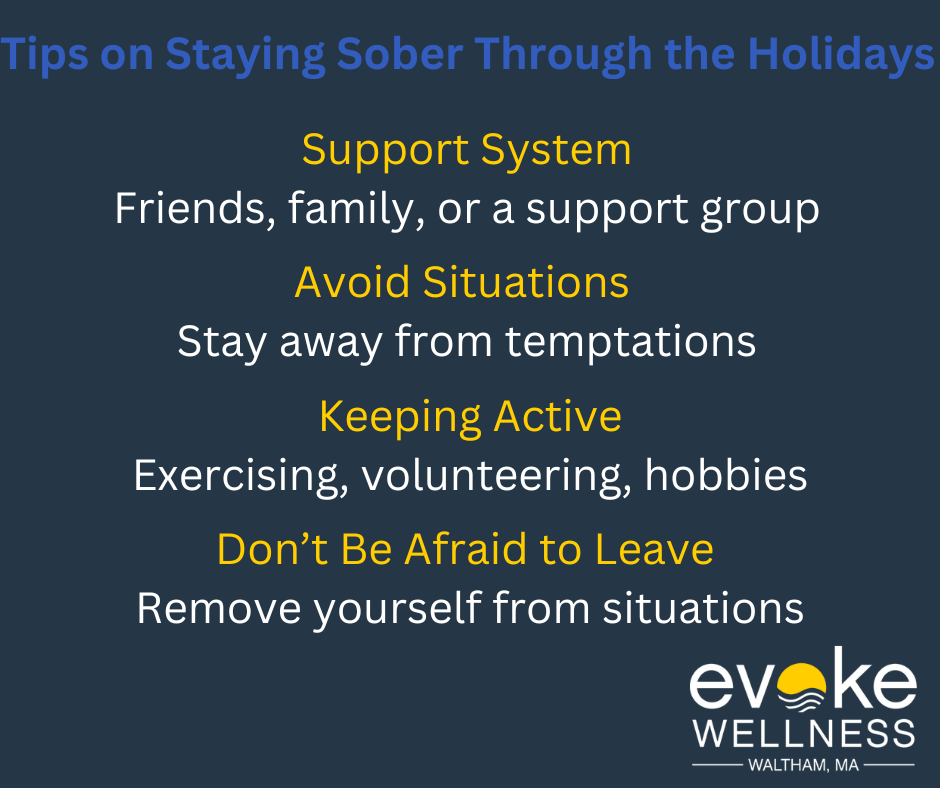Navigating the holidays while in recovery can feel overwhelming. As festive gatherings and celebrations abound, you may worry about maintaining your sobriety amidst the merriment. But with some thoughtful preparation, you can absolutely enjoy a sober holiday season. This guide will equip you with practical strategies to stay on track with your recovery goals, even when faced with triggering situations or well-meaning but misguided loved ones. You’ll learn how to craft a solid relapse prevention plan, set healthy boundaries, and find joy in new sober traditions. With these tips in your toolkit, you can emerge from the holidays with your sobriety intact and feeling proud of your accomplishments.
Call us at (833) 287-7223 today or reach out online.
Staying sober through the holidays
This can be challenging, but it’s definitely manageable with some planning.
- Support System in Place – Having a support system, whether it’s friends, family, or a support group.
- Avoid situations – Staying away from places where alcohol is the main focus, and always have a non-alcoholic drink in hand to avoid temptation.
- Keeping Active/Busy – Staying busy with activities that don’t involve alcohol/drinking, such as volunteering, exercising, or engaging in hobbies.
- Don’t be afraid to leave – If you feel uncomfortable, don’t be afraid to remove yourself from this situation. Prioritizing your sobriety is the most important thing.
How many days do you get in rehab?
The length of inpatient rehab programs can vary. Most residential treatment centers offer:
30-Day Programs
One month is the minimum recommended duration. This allows time to go through the initial detox process and start building a strong recovery foundation.
60-Day Programs
Two months gives more time to adjust to sober living. You can dive deeper into therapy and life skills training.
90-Day Programs
The optimal stay is around 3 months. Longer programs are associated with higher success rates and lower relapse risks after rehab. You have ample time to develop coping strategies and lifestyle changes.
The best time frame depends on your situation. Factors like the severity of addiction, co-occurring disorders, and home environment may require a longer or shorter stay. Work closely with professionals to determine the ideal rehab duration.
What is drug rehabilitation?
Drug rehabilitation refers to the process of helping individuals overcome substance abuse and addiction through various treatments and therapies. The primary goal is to support long-term recovery from drug or alcohol dependence.
A Comprehensive Approach
Effective rehab programs adopt a holistic approach, addressing not just the physical aspects of addiction, but also the psychological, social, and behavioral factors contributing to substance abuse. This multifaceted treatment aims to:
- Break the cycle of addiction
- Develop healthy coping mechanisms
- Build a strong support system
Tailored Treatment Plans
Each person’s journey to sobriety is unique, which is why rehab centers create personalized treatment plans. These may involve a combination of:
- Medical detoxification
- Individual and group therapy
- Counseling and behavioral therapies
- Medication-assisted treatments
- Relapse prevention education
Continual Support
Drug rehabilitation is an ongoing process that often requires multiple levels of care over time. Many programs offer aftercare services like sober living homes, alumni support groups, and regular check-ins to help maintain sobriety long after formal treatment ends.
The path to recovery is challenging but achievable with the right rehabilitation program tailored to your specific needs.
Which recovery program is for people with a drug addiction?
12-Step Programs
The most well-known recovery program is the 12-step model, originally developed by Alcoholics Anonymous (AA). It focuses on admitting powerlessness over addiction, making amends, and relying on a higher power. Narcotics Anonymous (NA) uses the same 12 steps tailored for drug addiction.
- Promotes complete abstinence from all drugs
- Emphasizes peer support and sponsorship
- Meetings are free and available worldwide
Non-12-Step Options
Some prefer alternative approaches like SMART Recovery or secular treatment programs. These science-based models teach coping skills and cognitive-behavioral techniques without any spiritual component.
- Focus on self-empowerment and self-reliance
- Encourage moderating substance use vs. abstinence
- Often integrated with professional counseling
The right path depends on your beliefs, needs and goals. Many combine different program elements for holistic recovery. Consulting an addiction specialist can help determine the ideal approach for you.
What to say to someone going to rehab?
Offer Encouragement
Tell them you’re proud of their decision to get help. Remind them that seeking treatment is a brave first step towards recovery. Reassure them that you’ll support them through the process.
Be Positive
Avoid negative comments or doubt about their ability to get sober. Focus on their strengths and determination. Discuss how rehab can help improve their quality of life.
Provide Reassurance
Let them know it’s okay to feel anxious or uncertain about rehab. Validate their concerns while emphasizing the benefits of professional care. Remind them you’ll be there when they return.
Suggest Healthy Coping
Encourage activities like exercise, journaling, or meditation to manage stress in rehab. Discuss strategies for avoiding triggers and handling cravings. Remind them to follow their treatment plan.
FAQ: Drug Rehab
Common Rehab Questions
- What is drug rehab like? Rehab involves medical detox, therapy, and building coping strategies. The environment is supportive and therapeutic.
- How long does rehab take? Programs range from 30-90 days on average. Some people need longer treatment depending on their situation.
- Will insurance cover rehab? Many plans cover some or all of the costs for substance abuse treatment. Check with your provider.
Choosing the Right Program
Drug rehab is not one-size-fits-all. Different programs specialize in various addictions, therapies, and levels of care. Take time to find one matching your needs.
- Inpatient or residential treatment immerses you in a substance-free environment 24/7.
- Outpatient rehab allows you to live at home while attending regular therapy.
Setting Yourself Up for Success
Addiction recovery is an ongoing process. Have a plan for aftercare like sober living, counseling, and support groups. This reduces relapse risk.
Surrounding yourself with positivity is key. Build a network of supportive friends and family. Find new hobbies and activities aligned with sobriety.
Conclusion
As you navigate the holiday season, remember that your sobriety is the greatest gift you can give yourself and your loved ones. By following these drug rehab tips, you’ll be well-equipped to face any challenges that arise:
- Plan ahead
- Lean on your support system
- Practice self-care
- Set boundaries
- Find new traditions
Stay focused on your recovery journey and the reasons why you chose sobriety. With preparation and determination, you can emerge from the holidays stronger than ever. Your future self will thank you for staying committed to your health and well-being during this time. You’ve got this – here’s to a sober, joyful holiday season!
Begin Your Journey with Evoke Wellness at Waltham
If you or a loved one is considering outpatient treatment, Evoke Wellness at Waltham invites you to contact us. Our compassionate team is ready to answer your questions, discuss your needs, and help you take the first steps toward recovery. At Evoke Wellness, you will find more than just a treatment program – you’ll discover a community dedicated to your wellness and success. Together, let’s embrace the journey to recovery and the promise of a new beginning. Call us at (833) 287-7223 today or reach out online.



